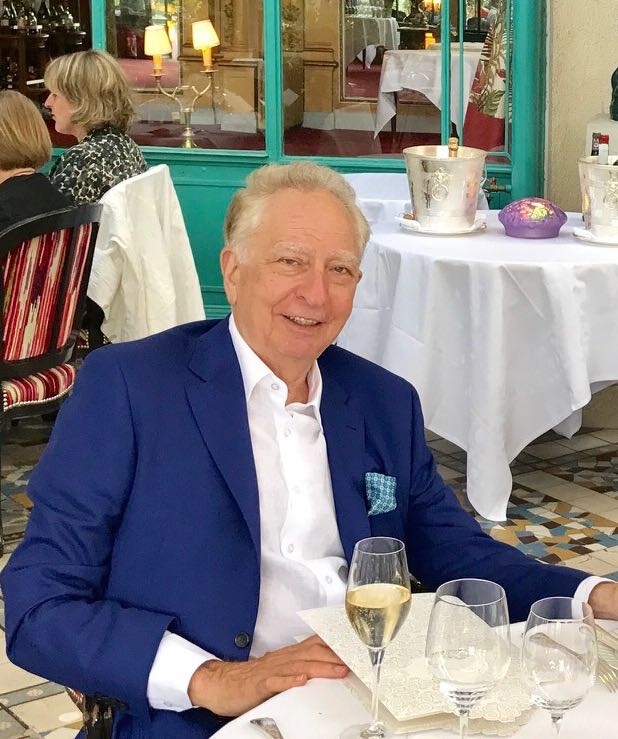Another hour and a half to go, thought Ed as he sipped a bo
ttle of water. He bypassed Jerusalem and continued through hardscrabble gulches, home to a few remaining Bedouins, their camels and donkeys hobbled next to their battered pickups. The road turned south, dipped into the Judean Desert. On the right, the bone-dry mountains and gorges of what geologists call the Afro-Syrian Rift; ahead and to the left, the Dead Sea shimmered in the late-afternoon heat.
Suddenly, a police car came barreling toward him; it flashed by, its siren howling, dust flaring in the sun. Careening after it, with the same banshee wail, came another police car, then another.
A terrorist attack at Masada or Beersheba, thought Ed. It was just after five p.m. He turned on the car radio and found the English-language news broadcast from Kol Yisrael.
“….three other people were injured. The blast occurred at three forty-five this afternoon. According to reports, the explosive charge was placed in a Volkswagen van parked near the café. Two of the injured were tourists. No one has yet claimed responsibility.
“Meanwhile in Damascus, the US secretary of state refused comment after completing talks with the Syrian president. Sources close to the secretary were ‘disappointed’ by the lack of progress.”
Jesus, thought Ed as the announcer rattled on, how the hell can anyone live with the constant tension in this place, the threat of violence always ready to explode? A military jeep and van roared by, headed north.
At the turnoff for the kibbutz, he saw where all the emergency traffic was coming from: a few hundred yards down the highway was a cluster of military jeeps and trucks. Soldiers in olive-green battle dress had cordoned off a group of buildings by the Dead Sea: the Ein Gedi Spa.
Ed parked and walked to the checkpoint. A gaggle of German tourists had stopped, and one of them, a potbellied blonde, was chattering into her cell phone, giving a strident account to friends or family in Germany. The others were taking pictures of one another posed in front of the soldiers.
A stringy, gray-haired reservist manned the checkpoint, a TAR-21 slung from his shoulder. Ed produced his Israeli press pass.
“Only emergency workers allowed through.”
“What happened?” asked Ed.
“A car bomb at the spa.”
“When?”
“I don’t know,” the reservist snapped. “Two hours ago. Maybe less. I can’t talk to media.”
The explosion had hit thirty yards away. The van must have been parked by the front door of the spa’s café. Shards of painted silver metal, twisted steel and chrome, were all that remained of the vehicle. The blast had cratered the highway, knocked a hole in the cement wall of the coffee shop, blown out the door and all the windows.
Two investigators in plain clothes were picking through the debris, taking measurements and notes as they went. Three young men wearing bright yellow vests—ultra-Orthodox volunteers from the Zaka organization—were carefully collecting body parts and shards of human flesh, some hanging from the branches of the palm trees, to return to their families for religious burial.
There was still a thin veil of dust and a faint, acrid smell in the air. Ed coughed a couple of times. He could already feel his chest tightening. An army colonel wearing wraparound sunglasses and the double-eagle insignia of AMAN came over. Between coughs, Ed again produced his press pass.
“No comment,” said the colonel. He was obviously from the States originally.
“Just tell me, off the record, what happened?” Ed paused for a breath. “I’ve a friend who lives here.”
“Can’t do.” The officer nodded toward the nearby hill. “Ask at the kibbutz.”
Ed gasped again, and the officer’s eyes abruptly narrowed as the reporter reached for his pocket and withdrew a dark-blue device.
“Asthma,” said Ed. “The dust.” The last thing he needed was for this hair-trigger colonel to think he was reaching for a weapon. He inserted the inhaler in his mouth, pressed, and inhaled deeply. After a few minutes, he could feel the bronchial passages opening, but the relief was only temporary. His breathing was still labored. He had to get away from the site and the irritants swirling in the air.
****
He walked unsteadily to his car, drove back to the highway, and waited there for a few minutes until the attack had receded. Then he took the asphalt road that wound up the hill to Ein Gedi, passed a soccer field, where teenagers in blue shorts and T-shirts scampered about as if car bombs were a daily occurrence, and pulled into the parking lot by the dining hall and a newly built auditorium. Children ran laughing through sprinklers that watered the thick green lawn. Tidy flowerbeds lined the paths leading to the bungalows. This could be a middle-class suburb anywhere in the Southwest, thought Ed, if it weren’t for the Israeli flag flapping in the breeze, the security fence ringing the entire settlement, and those young men back at the blast site and their baskets of human flesh.
There was a cluster of people at the entrance to the dining hall. They stared at Ed as he approached. He stopped before a squat man wearing a Dodgers baseball cap, sandals, and khaki shorts. He was peeling an orange.
“Shalom,” said Ed, “can you tell me where is the house of Dov Ben-David?”
“Who wants to know?” The man put a wedge of orange into his mouth.
“Ed Diamond. I’m, uh, an old friend of Dov’s.”
“It’s too soon to be making condolence calls, don’t you think?”
The man squinted against the sun and tossed the orange peel into the dust. “Dov—he’s dead, alev hashalom, killed by the bomb.”
----------------------
To read reviews of "The Watchman's File File", from reporters and experts who know this part of the world, click here.
The book is available on Amazon in soft-cover and Kindle formats.

